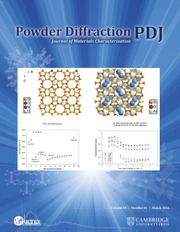Article contents
An innovative EDXRD verification probe
Published online by Cambridge University Press: 29 February 2012
Abstract
Verification of materials is an increasingly important need in pharmaceutical distribution. XStream Systems, Inc. has developed an energy dispersive X-ray diffraction (EDXRD) system which can quickly verify crystalline pharmaceuticals in the distribution cycle. Materials may be in solid or powder form and the technique is nondestructive. Unlike angular X-ray diffraction (AXRD), a “white” X-ray beam between 20 and 80 keV is used. This energetic beam can penetrate through relatively thick materials, diffracting from crystallites within the samples. Materials can be observed even when they are located within opaque, sealed containers. That is, for most cases the drugs can be examined in their sealed, packaged vials without any sample preparation. The tabletop unit uses a confocal geometry to maximize the X-ray intensity from a relatively low-powered, air-cooled X-ray source. The beam is collimated by a circular slit assembly before the sample. A similar slit assembly after the sample collimates the diffracted beam. A single, state-of-the-art, CdTe solid-state detector with a multichannel analyzer is used to process the diffracted signal. This collimation system interrogates a doughnut-shaped volume within the sample under test. One of the design goals was to develop a unit that is capable of performing quick verification or detection of complex materials and mixtures at a number of points along the distribution paths yet can be operated by personnel with minimal scientific knowledge. Rapid identification of unknowns is possible using neural network search algorithms or pattern matching techniques. The Material Recognition Software Engine (MRSE) utilizes a localized SQL database to store and process the raw spectra data. The MRSE takes the sample data and determines if it matches any known patterns within its database. This engine has demonstrated that it can verify a number of drugs within 30 s with better than 97% accuracy.
- Type
- X-Ray Diffraction
- Information
- Copyright
- Copyright © Cambridge University Press 2009
References
- 2
- Cited by


